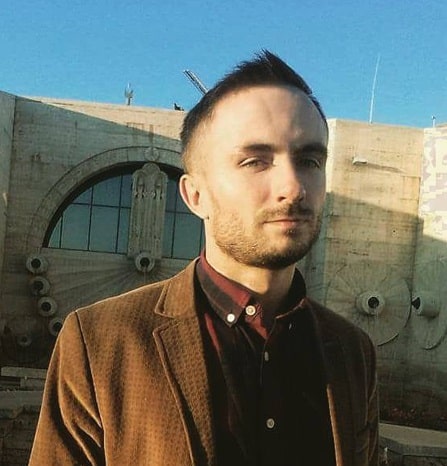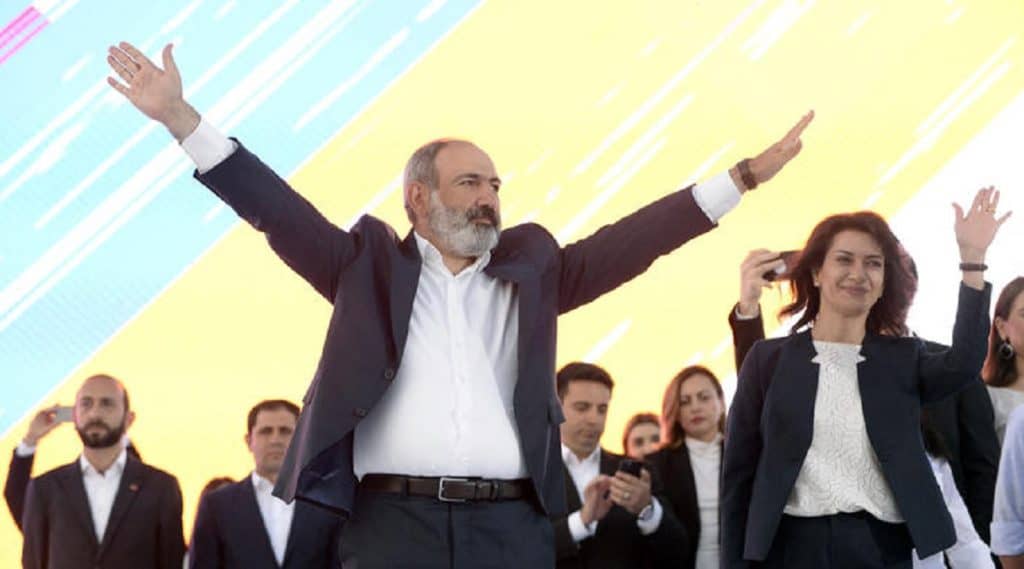By Anton Evstratov
In the elections held on June 20, Nikol Pashinyan achieved a landslide victory, while his opponents, having received as many votes as possible, showed not only low popularity but also very unenviable prospects for the future.

The results of the Armenian parliamentary elections held on June 20 turned out to be predictable overall; however, they surprised in some more specific aspects. The victory of Nikol Pashinyan and his “Civic Accord” party, which many had predicted, turned out to be more convincing than expected: the party obtained over 53% of the vote (however, there were other predictions, in particular, Gallup Armenia published opinion polls showing the greater popularity of Robert Kocharyan; however, these studies were clearly biased and logically were disproved by the elections). Their closest rival, the “Armenia” bloc led by former president Robert Kocharyan, got only 21% (after recounting the votes of minor parties that failed to enter parliament. The initial indicator of “Armenia” was just over 17% against 51% of “Civic Accord”). Thus, we again have the dominance of a single political force loyal to Nikol Pashinian, as well as a one-party parliament.
The opposition’s previous hopes of being able, if not to win, at least to secure a coalition that could possibly overcome the Civic Accord, which won but did not get an absolute majority of votes, were untenable. Even an alliance with the “Honor I Have” bloc of Artur Vanyan and Serzh Sargsyan, which garnered just over 5% of the vote, makes it impossible for “Armenia” to get its agenda passed in parliament.
The results of Gagik Tsarukyan’s Prospera Armenia party and Edmon Marukyan’s Enlightened Armenia party are so low that they will not be represented in the new composition of the National Assembly.
In the case of Tsarukyan, it is a surprise because he is a stable politician who has never really claimed victory and dominance in the National Assembly, but was regularly elected there during all the last convocations of the parliament. The fact is that Prosperous Armenia has perhaps the most stable electorate of all Armenian political forces, consisting mainly of employees of the enterprises of Gagik Tsarukyan, one of the biggest businessmen in the country. For such an electorate, it is not so important how their candidate and party will act in the political arena, what statements they will make and what program they will present – in this case, it is about their stability and professional success.
It should be noted that Gagik Tsarukyan’s businesses provide jobs and relatively good working conditions to thousands of Armenian citizens, and sometimes, in depressed communities and regions where there is virtually no relevant alternative. This “loyalty” of the electorate, which Tsarukyan has demonstrated many times in the past (including immediately after the Velvet Revolution, when, it would seem, against the backdrop of the struggle against the oligarchy, his position should have faltered), gives him considerable room for political maneuver, making him an extremely valuable ally for any political force seeking to dominate Armenia.
However, “Armenia Prospera” failed to enter the National Assembly on June 20, garnering only 4% of the vote. Perhaps, it is because of the recent scandals associated with Gagik Tsarukyan, in particular, the April wedding of his son, which was held with a great spectacle in a country that lost the war, suffered from economic crisis and pandemic, and was flooded with thousands of refugees from Artsakh. One must also note the serious differences between Prosperous Armenia and Pashinyan’s supporters, as well as his highly controversial role during the 44-day war in Karabakh (it is known, for example, that the unit formed by Gagik Tsarukyan never made it to the front).
“Enlightened Armenia” of Edmond Maroukian, on the other hand, is generally loyal to Pashinyan and the government, but at odds with it on specific issues. It is a moderate pro-Western party, but is ready to cooperate with Russia. At the same time, Marukyan had some difficulty getting into parliament earlier, and on June 20 his party’s votes (which got only 1.22%, which looks like a failure) were largely amassed by the Civic Accord.
The relatively active vote of Pashinian supporters was largely protest in nature – people chose this force not because they believe in its ability to solve Armenia’s problems, but because they do not want the return of the old authorities personified by Robert Kocharian, Serzh Sargsyan and their supporters. Perhaps if the opposition had other leaders and other political forces as leaders, the results of the “Civic Accord” would have been much more modest. It is also worth noting the remarkable political apathy of Armenian citizens, only 49% of whom went to the polls on the 20th, a very low figure for the country. Society gave another vote of confidence to Pashinyan’s supporters, but this time it did so reluctantly, forcibly, and choosing between bad and very bad.
After the announcement of the election results, Nikol Pashinyan summoned representatives of all political forces, including the opposition, for further consultations on the future of Armenia. It is possible that many opposition figures will be involved by the government to resolve some issues in specific positions. Thus, there are already rumors that Lieutenant General Samvel Babayan, leader of the Republic Party, will soon be included in the new Cabinet of Ministers of the Republic of Armenia.
Samvel Babayan is a politician and military man whose importance to contemporary Armenia and Artsakh is hard to overestimate. He was the commander-in-chief of the Artsakh Defense Army during the first war in the early 1990s. It was he who created the armed forces of the unrecognized republic and ensured their victory over the Azerbaijani army. In addition, Babayan, then head of Artsakh’s Security Council, predicted the latest Azerbaijani aggression and its outcome and asked the government to introduce emergency measures, but did not receive an adequate response to his request. After November 9, 2020 Babayan declined the title of Hero of Artsakh, and participated in the parliamentary elections in Armenia, in which his party “Republic” obtained just over 3% of the vote.
However, Robert Kocharyan and his supporters have not recognized the election results; they are preparing both street protests and a fight through the Constitutional Court, hoping for a recount. However, according to observers, witnesses, and participants, the current elections have been relatively fair and transparent – in large part due to the development of video and photographic equipment, making it easy to capture and stop violations. Kocharyan’s camp also considers the prospect of relinquishing his deputy terms in the National Assembly, which could sabotage the latter’s work on formal and constitutional grounds.
Despite the former president’s reputation as “Putin’s friend” and “Russia’s ally,” Moscow, Yerevan’s main ally, has reacted to the election results in Armenia quite favorably. This is due to the fact that, on the one hand, Russia has learned to work with the new Armenian government and, on the other hand, Pashinyan and his team have repeatedly demonstrated their loyalty to Russia. An important factor in this loyalty is Armenia’s high degree of dependence on Russia after the defeat in Karabakh in almost all spheres, from the security and protection of the remaining territory of Artsakh to the economy and anti-coronavirus measures (in Armenia Covid-19 is currently inoculated mainly with Russian Sputnik-V vaccine).
Thus, as conceived in Moscow, Kocharyan remains an instrument of pressure on the current authorities of the Republic of Armenia (although much less strong than many expected), which, in turn, suits the Kremlin and is completely controlled by it. In the coming years, Yerevan will not be able to make important and decisive decisions without consulting its ally, and changes can only take place in very local spheres of domestic politics, in the form of specific appointments and reshuffles.
At the same time, there is currently a growing polarization in Armenian society between supporters and opponents of the government, which is undoubtedly a negative factor, given the difficult tasks the Armenian people are facing in terms of reconstruction and further regional operation.
However, the period of socio-political turbulence in Armenia, if it is possible, is unequivocally over. Robert Kocharyan and the representatives of the old government he personifies, even with Armenia’s military defeat, coronavirus, economic problems and Azerbaijani intervention in Syunik and Gegharkunik, conducting a serious and expensive election campaign with street actions, the “Anti-Nikol” movement, interviews with Russians and propaganda on Armenian own channels, managed to get only 21% of the votes. This is its maximum. Meanwhile, as the tensions around Artsakh and Armenia’s security diminish year by year and Armenian society gets used to the new realities, as well as Kocharyan himself and his age-mates age, their popularity will diminish even more. In this sense, the June 20, 2021 elections were also a reflection of the generational shift in Armenian politics.
Author: Anton Evstratov (Russian historian, publicist and journalist living in Armenia, lecturer at the Department of World History and Foreign Regional Studies at the Russian-Armenian University in Yerevan).
(The views expressed in this article belong only to the author and do not necessarily reflect the editorial policy or views of World Geostrategic Insights).
Image credit: AFP / Karen Minasyan







